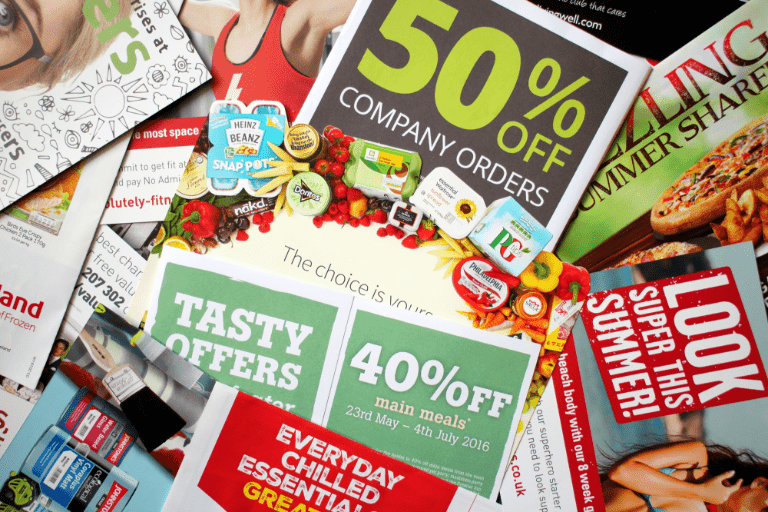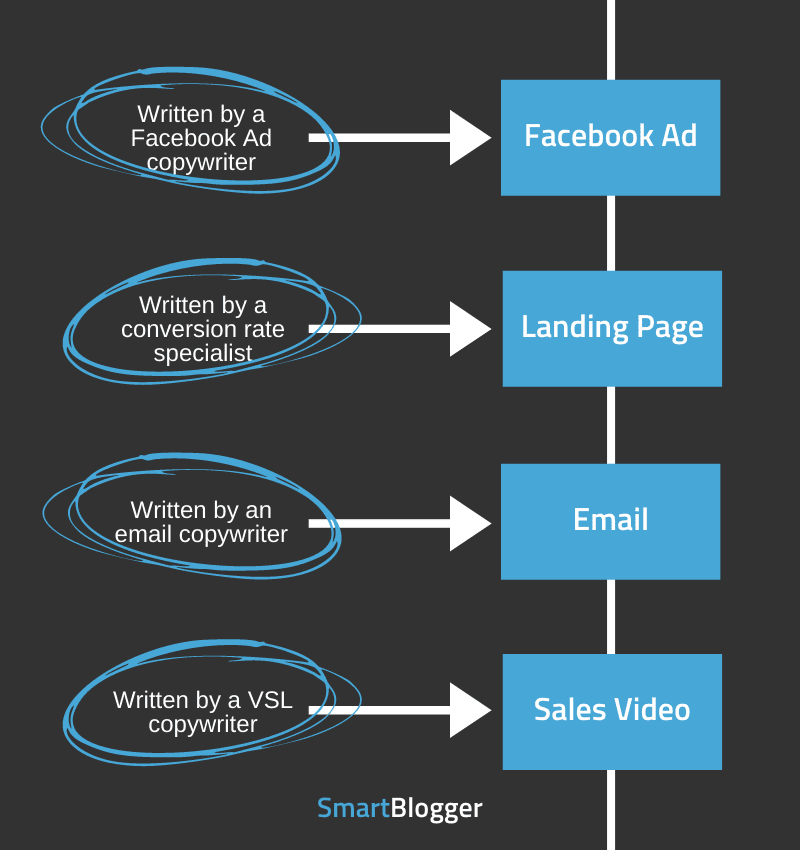Most of what you hear about copywriting is a lie.
Yes, it can be a great side hustle or even a full-time career, but it’s not the fantasyland many copywriting courses portray it as.
I’ve written copy professionally for about 12 years, earning millions from it (yes, I said millions).
I’m friends with some of the best copywriters alive like Kevin Rogers and the late Dan Kennedy. I’ve also paid professional copywriters hundreds of thousands of dollars to write great copy on my behalf.
In other words, I’ve seen every side of this business. I know what the average day-to-day life of a copywriter is.
And it’s nothing like what most copywriting training companies sell.
Don’t get me wrong, it can be a good life. If you’re willing to work hard for years, mastering your craft and building your reputation, I think it’s an excellent skill set to learn.
But it’s not easy, fast money.
In this post, I’ll lay out a realistic and achievable career path for you to follow. It takes time and hard work, but stick with it, and it will pay off.
If you’re wondering exactly what to do, step-by-step, here’s the overall process for how to become a copywriter:
- Learn the basics of effective copywriting from books
- Choose a copywriting specialty (email, Facebook, etc.)
- Write some copy for yourself or friends
- Get your first gigs from job boards
- Build your reputation to generate referrals
We’ll go through each of those steps in detail in this post. You’ll leave knowing exactly how to become a copywriter and scale up to six figures.
That being said, let’s start with the basics…

What is Copywriting? What is a Copywriter?
You’d think copywriting would have a simple, standard definition, but it doesn’t.
The most accepted definition used to be “salesmanship in print,” but that was before the rise of video and the Internet. Nowadays, copywriters work in every medium.
So, I’ll give you as broad of a definition as possible:
A copywriter creates sales or marketing material that influences the prospect toward making a purchase.
In other words, a letter you receive in the mail, an advertisement you watch on TV, a voicemail message you receive from a salesperson, a marketing email to subscribers, a landing page with a CTA for a product, a video on YouTube about a product, a press release, push notification, and a webinar are all examples of copywriting.
Here’s the important point to understand:
Copywriters are involved with every part of sales and marketing. In fact, many specialize in a particular type of copywriting work and ignore all others.
Types of Copywriters
For example, a direct mail copywriter focuses on what most people refer to as “junk mail” and may never write an email or sales letter. Chances are, you throw away their work on a daily basis.

But not everybody does. Enough people open those envelopes for direct mail to be a multibillion-dollar industry. It’s also one of the oldest specialties.
Email copywriting and Facebook copywriting (and other social media posts) are two much newer specialties. For example, here’s a Facebook post we paid a skilled copywriter to write:

And here’s an example of an email I recently asked a copywriter to write:

Other types of written copy include:
- Sales letters — A long, one-page sales letter commonly used to sell information products. Here’s the one we use for Paid to Write.
- Blog posts — While blogging isn’t normally considered copywriting, any blog post intentionally used to influence a sale could be written by a copywriter (aka “content writer”). This is referred to as “middle of funnel” or “bottom of funnel” content writing.
- Product descriptions — E-commerce and catalog companies frequently pay copywriters to come in and touch up their product descriptions.
- App homepages — Copywriters will tell you about the features and benefits of an app, explain the pricing, etc.
- White papers — In the B2B space, lots of companies create white papers to demonstrate their product. Copywriters write these.
- Lead magnet copy — Even though it’s a short copy, a copywriter will often create multiple variations of an opt-in web page or pop-up to give a freebie in exchange for an email address.
In general, you can divide copy into two categories: direct response or branding.
With direct response copy, you want the prospect to take action immediately. Lead magnets and sales letters would fall into this category.
With copy written for branding, your goal is to create trust and memorability around the product, company, or personality. White papers and even types of content marketing, digital marketing, and SEO copywriting (Search Engine Optimization) would be good examples of branding.
Scripting for Videos, Webinars, and Ads
Remember, copywriting isn’t limited to the written word anymore.
These days, a lot of copywriters also script videos, webinars, and advertising copy. For example, we have a video sales page for our Freelance Writer’s Toolkit that converts quite well:

Before producing the video, first I wrote a script:

This may come as a surprise, but I also script many of my webinars as well. Same for any videos that are part of a marketing campaign.
Why?
Because I want to make sure I say the right things in the right order. If I do, people buy more, which makes it too important to be left to improv.
The bottom line?
There are many different types of copywriting, and most copywriters specialize in one or two types. No one does it all well. Many times, you actually have multiple copywriters working together to create a single campaign.
How Copywriters Create Marketing Campaigns
For example, a Facebook ad copywriter might write a post that leads to a landing page. The landing page ad copy would be written by a conversion rate specialist (another type of copywriter).
Then the prospect might receive an email, carefully crafted by an email copywriter, and inside that email, you might find a link to a sales video written by a video sales letter (VSL) copywriter.

This is a relatively simple marketing campaign, and there are already four different types of copywriters involved! To make it even more complicated, not all copywriters are even called copywriters — take the conversion rate specialist in the above example.
In fact, I would go so far as to say most copywriters do not have “copywriter” in their job title. They are probably called a conversion rate specialist, a media buyer, a marketing consultant, a social media manager (Facebook, LinkedIn, etc.), or something else entirely.
But they are creating materials that influence the prospect to purchase. Therefore, they are all copywriters in my opinion.
How to Become a Good Copywriter
Now that we’ve covered the basics, let’s dive into how to become a good copywriter.
Do you need a formal education? A Bachelor’s degree? A high school diploma or certificate of some sort?
These questions always make me smile.
To some degree, copywriters are like the pirates of the marketing and sales industry. They are allergic to the “chain of command,” often disappear for months or years at a time, and are attracted to opportunity more than anything else.
In other words, the idea of a degree in copywriting is about as absurd as a school for pirates.
That being said, there are plenty of learning resources out there for the aspiring copywriter. They just aren’t very formal. Many are even free.
Free and Cheap Copywriting Resources
You can learn a lot from reading copywriting books.
Cashvertising (affiliate link) is my favorite book for beginners — it’s a great summary of all the others, written in more modern language.
Tested Advertising Methods (affiliate link) is also absurdly good if you can get your hands on it (it’s out of print). Other old books like The Robert Collier Letter Book, Ogilvy on Advertising (by David Ogilvy), and Scientific Advertising (affiliate links) are also good.
Personally, I started my copywriting career at the library. They had several books, all of which I eagerly consumed, and then I moved on to sitting in the aisles of Barnes & Noble, reading copywriting books in a single sitting and then putting them back on the shelves.
Ethical? Perhaps not, but I was broke in the beginning of my career, and I was perfectly happy to be chased out of the bookstore if need be.
These days, there are also quite a few high-quality podcasts you can listen to for free. This one from Kevin Rogers is excellent.
What to Look for in Copywriting Courses
Eventually, you might decide to buy some courses.
If you do, avoid anything promising you generic copywriting advice. Most of the time, it’s just a rehash of what you’ll find in free or cheap books.
You’re much better off purchasing a course focusing on a specific specialty like email copywriting or creating extraordinary webinars.
Like I said before, the different specialties are quite different from each other. In many ways, each one is like learning a new language. Picking up your second or third specialty is much easier than your first, but you’d also be a fool to try mastering more than one language at a time.
So, focus on one.
Also, pay attention to the testimonials from students getting paid copywriting work (or lack thereof). Many copywriting courses teach you the mechanics of a particular style of copywriting, but they don’t tell you very much about how to get a potential client or work with those clients in the real world.
Personally, if I were getting started again, I would want a course that teaches me all of it.
Unfortunately, there aren’t many right now, but there might be one or two coming soon… (hint, hint)
Writing Copy for Yourself and Friends
Of course, the best way to become a good copywriter is to write copy. Lots and lots of it.
Here’s why:
Ultimately, copywriters are judged on one thing: sales. The more good copy you write, the more you will see how it affects sales, and the more you will learn.
Now… what if you don’t have anything to sell?
You have a couple of options:
- Promote an affiliate product. You can write your own email campaign or webinar to promote someone else’s product. In addition to making money, you’ll also get to hone your copywriting and creative writing skills. Legendary marketer Jason Fladlien made over $10 million one year promoting someone else’s course and writing all of his own copy for it.
- Write some copy for a business owner friend in exchange for data and their permission to write a case study. You’ll learn a ton, help your friend, and build proof that you know what you are doing all at the same time.
The bottom line:
While learning copywriting from books, podcasts, and courses is well and good, you’ll learn much more by writing copy in the real world, having some successes and failures, and making revisions until everything works properly.
And that brings us to the next big topic…
How to Become a Freelance Copywriter
You might’ve heard freelance copywriting is the highest-paid type of freelance writing — and you’re right, it is.
I’ve made millions from it, and I’m NOT one of the top-earning copywriters out there. There are guys like Gary Bencivenga and the late Clayton Makepeace who make me look like a chump.
But here’s the problem…
Many of the people teaching copywriting like to make you believe it’s normal, and it’s not.
How Much Do Freelance Copywriters Really Get Paid?
Saying you want to write professional copy like Gary or Clayton is like saying you want to play basketball like Michael Jordan.
Is it possible?
Sure, but it’s possible I’ll sprout wings and learn to fly. It may be possible, but it isn’t normal.

For an in-house employee, a typical copywriter salary is around $60,000 per year in most cities. For a freelancer, you could safely raise those rates to about $75,000 – $80,000 for a copywriter with a couple years experience and a handful of good clients.
If you want to reach six figures, you certainly can — lots of experienced, successful copywriters do — but you need proof of your copywriting skills and the constitution to handle the pressure. Here’s what I mean…
How to Become a Six-Figure Copywriter
There are reasons top copywriters make so much.
Business owners don’t just wake up and say, “Golly gee, I’d like to give a freelance copywriter $20,000 today, just for the hell of it!”
If they are paying you $20,000, they probably expect to make $100,000 or more from the campaign.
And you’re expected to make that happen. Or else.
Being a professional copywriter is like being a pro athlete. You’re expected to perform. It also takes years of training and practice to be able to perform at that level.
Are you ready for that kind of pressure?
To command those rates, you also need proof you can deliver the goods.
What Potential Clients Are Looking for
Testimonials, case studies, famous clients — it all has an enormous impact on how much you can earn.

If a copywriter really wants to earn six figures, I often advise them to work with a well-known and influential client as quickly as possible, even if they have to work for peanuts, because the proof they will get from that prospective client is literally worth millions over the course of their career. Proof is priceless.
But even if you start working with small clients, make sure you…
- Collect data on the impact of your copy
- Write testimonials for your clients and ask them to approve them
- Speak at conferences to build your reputation
- Write for well-known blogs and magazines
Ultimately, most clients care more about your ability to get sales than anything else, so the more evidence you have of being able to do that, plus the halo effect from speeches and published articles, will carry you to getting all the work you can handle.
Where to Find Copywriting Jobs
But what if you’re a beginner with no reputation?
How are you supposed to convince a prospective client to work with you?
My advice:
Watch job postings and apply for as many freelance copywriting gigs as you can.
On sites like Upwork, you can find a steady stream of work. A lot of it will be from small clients who don’t pay well, but it can pay the bills and give you some case studies and writing samples of work. If you dig around enough, you’ll also occasionally stumble across good clients. They do exist there, and some can even lead to full-time copywriter job opportunities.
You can also watch premium copywriting boards like Copychief.com. They have the most active job board by far. Many six-figure copywriters continue to get lots of work there.
As you specialize in a certain type of copy, you can also get referrals from your teacher. Lots of the top copywriting instructors are happy to recommend their students. For example, I typically go to Justin Goff whenever I want a top-notch email copywriter or upsell specialist, because he is a well-known teacher of both.
That being said, Justin specializes in working with six-figure copywriters and charges students something like $25,000 per year, so referrals from him might not be in your price range in the beginning.
Regardless of where you find gigs, the key, in the beginning, is volume. Expect to apply for lots of part-time writing jobs and only get one or two out of 10 in the beginning.
As your writing portfolio improves, so will your success rate when applying for freelance copywriting jobs, but it takes time. Expect to pay your dues and be patient.
A Word on Working with Agencies
Advertising and content marketing agencies are some of the steadiest sources of work for a new copywriter. Here’s how it works:
- The advertising agency hires you as a copywriter, usually on a salaried basis, but small agencies might keep you as a freelancer with a retainer;
- You work with agency clients, gaining writing experience and connections while also being paid;
- The copywriting client pays the agency for your work. You don’t get a cut of this — you are paid according to your agreement with the agency.
It’s the same model as any service business. A law firm might bill you $200 per hour but then pay their lawyers a salary.
Or, if they keep you as a freelancer, you act like a subcontractor, the same way a plumber or electrician would work under a general contractor when building a home.
The advantage of working with agencies is you get steady work and often a guaranteed paycheck. It’s also easier to focus. The agency is responsible for getting all the clients, and you can focus on serving them.
The downside is you’re not going to get paid as much as if you were working with the clients directly. In time, many copywriters decide the trade-off isn’t worth it and start their own copywriting business or agency, but in the beginning of your career, it’s a solid option.
How to Become a Copywriter, Step-By-Step
Feeling overwhelmed with all the information here?
Trying to figure out what you should do first? Second? Third?
Well, let’s go back to the steps I outlined in the beginning, and we will wrap up with some concrete, actionable steps:
1. Learn the basics of effective copywriting from books
One of the most important questions you need to answer is:
How committed are you to becoming a better copywriter?
Yes, it’s a great career, but only if you genuinely enjoy it, and it’s impossible to know without first dipping your toe in the water.
That’s why I think everyone should start by reading a copywriting book. If you enjoy it, continue on the path, but if it’s a slog, you can stop and do something that’s a better fit for you.
Worst case scenario, you lose the few bucks you paid for the book.
2. Choose a copywriting specialty (email, Facebook, etc.)
Once you’ve decided that you want to become a copywriter, and you’ve learned the basics from books, you can move on to choosing a specialty copywriting skill and mastering it.
So, your next step is to purchase a course on one of the copywriting specialties. In the future, we will be releasing a few of those here at Smart Blogger, but in the meantime, simply Google “[SPECIALTY] copywriting course” to see what’s out there.
Another option is to start with a general community like Copychief.com and ask for advice on the best courses. You’ll get lots of current recommendations from copywriters who have taken the courses.
3. Write some copy for yourself or friends
Now it’s time to get some practice.
If you have access to a traffic source like your own email list, blog, or social media groups, you can try some persuasive writing for yourself, either promoting your own product or someone else’s.
If you do NOT have access to a traffic source, offer to write some sales copy for a friend who has their own small business. Many times, you can meet these people inside the specialty course you purchase.
Just don’t forget to gather DATA.
The most important part of this step is to see how your compelling copy performs “in the wild.” You’ll learn a lot about where you need to improve and maybe even develop your first case study.
4. Get your first gigs from job boards
This is the hard part.
Nobody enjoys getting turned down from job after job, but it’s a part of the process in the beginning. The smartest thing you can do is to sign up to multiple job boards, including mega sites like Upwork, and start applying for lots of freelance copywriter jobs.
How many is “lots?”
Dozens at least. Worst case, apply for 100 jobs. If you apply for 10 jobs per week, that will take you 10 weeks.
5. Build your reputation to generate referrals
If you make it to this step, you’re already well on your way to becoming a successful copywriter. Congratulations!
In general, this step is also a lot of fun. You’ve gotten to the point where you know what you are doing, and you’re ready to start making a name for yourself.
Here’s how to do that:
- Speak at a conference (either marketing or industry-specific)
- Write a guest post
- Publish a case study on your own website
You Now Know How to Become a Six-Figure Copywriter!
Seriously, that’s the whole process.
Yes, it takes a while. Yes, some of the parts are scary (especially applying for a copywriting job!). And, yes, there’s still lots for you to learn — here, I just gave you the big picture.
But you’re on your way. You now have a roadmap to guide you through all the steps you need to take.
Eventually, you’ll get there.
And when you’re raking in the big bucks, it will all be worth it.



